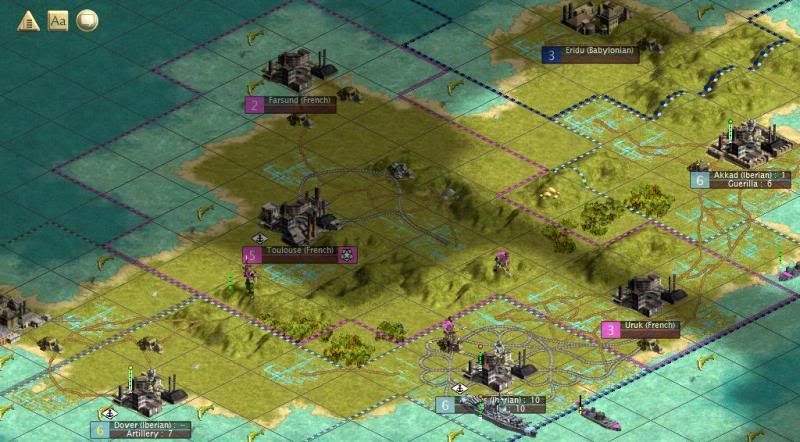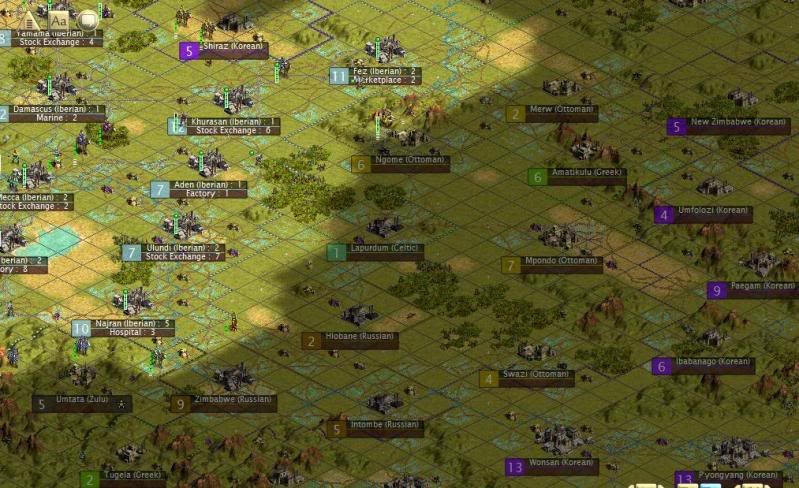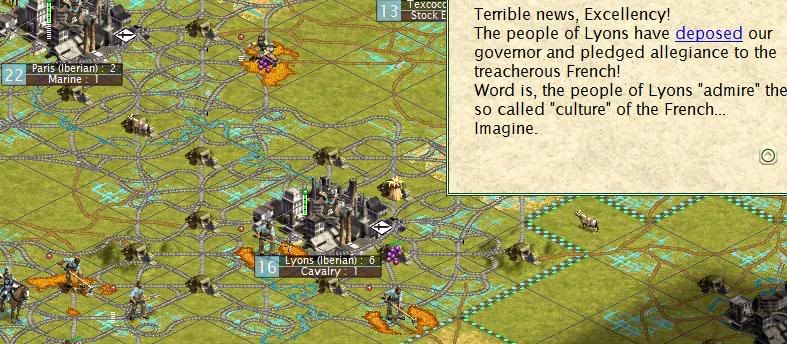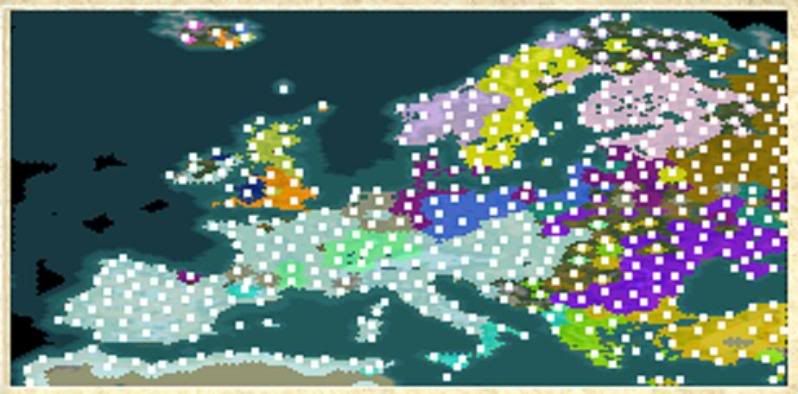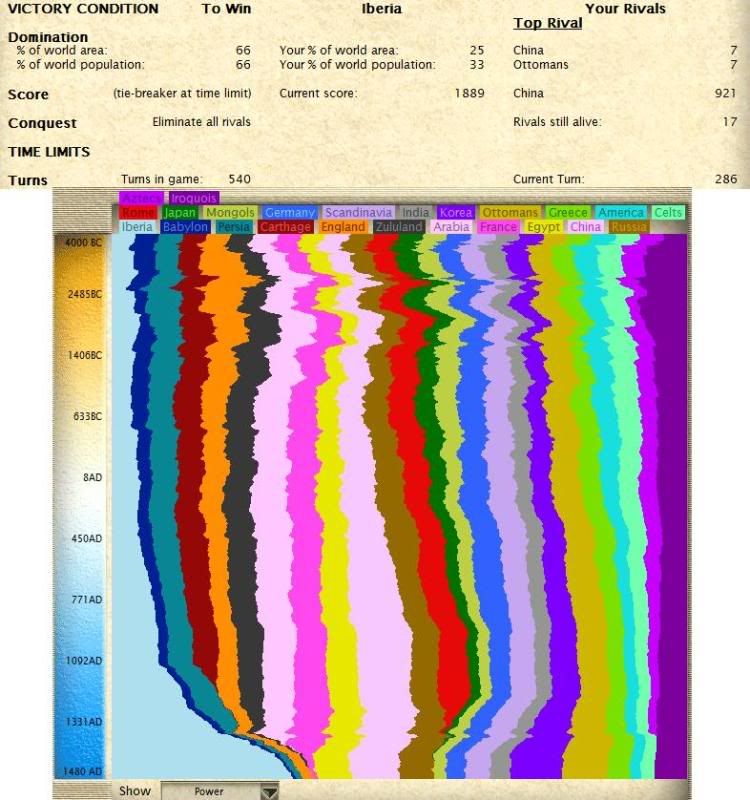The Irish Campaign and the Great Transition
The Irish campaign didn't begin until the Spring of 1446, when all of the necessary preparations had been made. As ships continued to go at full speed towards the Irish socialist republic, troops deployed onto the beaches of Amiens.
But before that, the Tourian revolt broke out in 1443. The people of Tours rose up in revolt against the French Empire and Duke of Normandy, saying that only the Socialist Confederation could rule over them. Maria's realpolitiker was going to come out.
She started by ordering a massive shelling to dispose of the guerrillas and riflemen that armed themselves inside it. A total of 19 artillery groups were assigned to the city of Tours to destroy it's defenders. Eventually, all three riflemen groups - one regular and two conscript - and the guerrillas inside were reduced to minimum strength. Cavalry hordes poured in. The resistance members fought bravely, but simply could not handle the skill and sheer weight of numbers the Iberian military had, resulting in the crushing of the revolt by the winter of 1444.
Few deaths were incurred, and over 66% of the population resisted occupation. Iberia generally had a great track record for tolerating resistance - even violent - but this time the people were surprised to see all the rifles pointed right at them. They were told to gather all possessions and proceed towards designated locations. All who resisted would be arrested, and all who resisted arrest would be shot.
The remaining 660,000 people of Tours were evacuated from the city mostly peacefully, even if unwillingly. They were deported to the uncivilised wastes east of Arabstria, and while the Celtvetians had established a colony - with some citizens being of Avignon origin, actually, though most of the Avignon population had died out due to numerous reasons after being left to fend for themselves - in the region, the remaining pockets of anarchy and disorder would surely consume the hundreds of thousands of deportees. As before, children and infants were mostly repossessed by the state and redistributed throughout Iberia.
While Avignon had been completely destroyed, Tours was not. Most of the city remained intact, but became a ghost town. Iberians settled in the city center as revitalisation efforts went into place to Iberianise the city. A granary was set up first, and plans were made to build a military base and other necessities as the years went by. Tours would go on as the city of Vores.
Maria I's policy of "gentle genocide" - as critics would later call it - was naturally detestable, but nearly everyone agreed it was sound policy. Hundreds of thousands - or even MILLIONS - of people could be easily deported to the well-fortified eastern borders, where they would try to make a living amongst the rich lands, if they could live long enough to make use of them. Many defended Maria by saying that the people were allowed to bring provisions and all possessions with them - except gold and other valuable materials like gems - and their only real duty was to somehow make use of the land. As with the Avignon Deportation, the Tours Deportation saw most people involved die. Those that didn't usually found ways to integrate into the nearby societies, such as the Balkanzulu, Turks, Russians, or Celtvetians. Some lucky few would make it rich and powerful Koreomania, and be able to attain a stable living there, unlike in the unstable, anarchic settlements that littered the Balkanzulu Wasteland.
When the front opened - or widened, rather - against the Irish, it was a massacre. The Irish had long expected cavalry charges, which could be held back, more or less, by the riflemen defenses of Ireland. However, these new, ferocious marines were a new monstrosity, attacking from the sea and with weapons far greater than rifles or muskets - assault rifles. 6400 marines were lost that day, but that still left 3/4 of the total invasion forces intact.
The conquest of Amiens in 1446 caused the clock to start ticking for the socialist republic in Ireland. While the Irish had been able to score victories against the Norwegians and Gaelylonians, once the Iberian war machine was in full operation, it would steamroll the entire island.
As if to celebrate the victory, the Empire's first aircraft carrier - the MIB Aire Libre - was launched in 1447. While the Empire did not possess any aircraft, the prestige of the vessel was great enough, in addition to being a preparation for the launch of aircraft in the coming decades.
1449 CE, the Prussians joined the large European war against the Balkanzulu. Some of Maria's advisors told her she should begin moves against the Balkanzulu to claim some of the pie, but she refused...
Maria's death in 1453 CE, however, allowed her less-kind son, Julio Agosto II(r. 1453-1481), to come to the throne. Like the previous ruler of the same name, Julio Agosto had a fetish for Roman culture, envying it's militarisation and the penetration of the military into every corner of life. A powermonger at it's finest, Julio Agosto II was a firm believer in realpolitik and doing whatever was necessary to get his way and increase his power.
Soldiers had been anxious for decades. Why did Iberia need so many soldiers if it was peaceful? Many feared the loss of their jobs, as Maria had entertained the thought of scaling back the military. Not Julio Agosto, however. He made it clear that he would maintain, even expand, the army's current size.
The best way to apply this thought was to the former Balkanzulu Empire. As the Irish campaign slowed down thanks to stiff resistance and insurgencies, the former Balkanzulu Empire had fallen apart from a potent power in the Balkans to a city-state centered on Umtata. The powers of Europe had torn it apart into countless pieces, puppet states and provinces. The situation, however, was Iberia's fault. When Iberia triggered a war with Rome and England ages ago, the Zulu had been sucked in, and Iberia's alliances cascaded into a case of her former allies constantly bringing in new friends against the Balkanzulu. Accordingly, they were isolated and on the brink of destruction.
...Julio Agosto felt it only right that Iberia make amends for this mistake.
Iberia's potency as a military force had weakened, as the influx of rubber all across her neighbors' militaries allowed them to modernise and become far more capable of thwarting any Iberian incursions. Opportunities would be seized when they presented themselves.
The Celtvetians were such an opportunity. With only 8 groups of riflemen across their divided possessions, they were militarily weak. Furthermore, Frenchmen and Iberians alike hated the Celtvetians, the former for nationalist reasons and the latter for the fact the Celtvetians had, in recent decades, taken to excluding Iberia from any nominations to the seat of Holy Roman Emperor. The Celtvetians had also not yet discovered how to harness rubber, unlike Indutchia and Denmarqois, making them a good target.
...The fact the Celtvetians were allied against the Socialist Confederation, however, prevented any action. Eventually, however, the pact would run out, and if Julio Agosto could have lasted that long, he would have exploited it.
1454, the Greeks stormed the Balkanzulu capital, vanquishing another European monarchy.
1456, the Battle over the occupied Gaelylonian city of Uruk claimed very few Marines' lives, but wiped out two Socialist Cavalry groups and also sunk two groups of Ironclads. The Wiggum Government continued to possess two cities on the island, one of which was occupied from the Norwegians. On other fronts, however, the Confederation was dying as well. New Paris was under Norwegian occupation, and the Icelandic SR would surely fall given time.
1458, the turbulent times Europe was going through were made evident when delegates from England tried to get an alliance against Chinland. However, what would Iberia have gained from a war against the Chinnish?
1463, the Prussians declared war upon the English! It was unknown if anything would come of this, given both had access to rubber and therefore infantry.
1465, Emperador Julio Agosto II decreed that a massive hydroelectric plant be built in the city of Sonsboa. If the project was successful, similar plants could be built empire-wide. This would greatly curtail the massive pollution issues that the growing environmentalist movement kept bringing up.
Having not learned the lesson of Tours, the people of Lyons revolted in 1468. They massacred the local infantry garrison, declaring war on the First French Empire and it's overlord, the Iberian Empire. By the time troops were ready to retaliate, level-16 Lyons had turned into a level-9 city, and the artillery hadn't even begun to fire. The defenders were easily overwhelmed, being crushed by the artillery barrages. The city was occupied, and the fate of the city was to be decided...
2/3 of the population resisted occupation. Julio Agosto then gave the order to massacre - not deport, massacre - all people over the age of 18, or who chose to bear arms against the Empire. The streets soon were greasy with human fat, soldiers having to slay their inner humanity to complete their Emperador's order. Julio Agosto later earned his title, "the Bloody", as a result. As a result, nearly a million Frenchmen were slaughtered. The abandoned city was soon repopulated by loyal Iberians, and rechristened Soninais.
But Julio Agosto II didn't just have a taste for the blood of rebels. He had a taste for the blood of even good citizens.
He ordered the mass-murder of the citizens of Rheims - who weren't even rioting or revolting - next. The wealthy, prosperous city suddenly saw many of its' buildings condemned, before it saw it's people being murdered in the streets. 1.37 million people inhabited the city of Rheims, and only about ten percent of those people were qualified for mercy. Given that the entire city was composed of Frenchmen, it was a liability, with a tendency to riot. Julio Agosto added 1.23 million people to the lives he had slaughtered, giving him a grand total of at least 2.1 million. The city was rechristened Fléau and repopulated with Iberian citizens. A clear warning was then given to all cities in France: the Iberian Army would destroy any population center that dared to riot - riot, not just revolt - against the French Empire.
1473, the city of Toulouse in Ireland was seized by a daring cavalry charge. While many injuries were sustained, many cavalrymen escaped death, crushing the local Socialist Riflemen. The Wiggum government retreated to it's last fortress in Norwegian Farsund. With the fall of Toulouse, the Icelandic Socialist Republic was able to place the capital of the Confederation at the city of New Orleans.
Emperor Rene III of France was enjoying tamales with Emperor Julio Agosto II of Iberia in the royal mountain retreat just outside Edo in Arabstria, on the "permission" of the Arabstrian Archduke, a puppet of Julio Agosto's.
The two men discussed politics, in particular the "decimation policy" of the French Empire.
"Monsieur Julio Agosto, the French people have petitioned me to stop zee policy of decimay-shohn. Furthermore, zee effects of zees policy are quite problaymatic... 2.1 million dead zo far, and growing weeth each village uprising..."
"I understand the massive turmoil this is causing in the politics, demographics, and very economy of France, Rene, but I'm afraid disobedience must have it's price. What is to keep say, a metropolis like Paris in line, considering the fact they just rebelled against me?"
"...What?! Paree in flames?!"
"That is correct, Rene. Those disloyal scum have risen up against their rightful leadership. They call for the abolition of the monarchy, the removal of troops, and the installation of a..." Julio stuck out his tongue in disgust, "A republic. Such fools." He took a sip from his beverage.
"M-monsieur Julio... pl-please... Paree has 2.56 million p-people... Show m-mercy, just thees once?"
Julio looked like he was considering it...
"No. They must know their place."
Rene's despair at the fact Paris would soon be a bloodbath soon transformed into rage. "Enough of zees, zees nonsense! My grandfahzair may have been weelleeng to be zee slave of your muhzair, but at least she was not zee genocidal maniac! I am zee Keeng of France and your puppet second, Julio! As Keeng, I must serve and protayct zee people of Paree and all France!" He slammed his fists upon the table.
Julio blinked at such an outburst, before laughing.
"Oh Rene. How true that may all be. However..."
His tone darkened, as did the look on his face.
"Since your court is just outside the city limits, are you not a resident of Paris as well...?" He picked up his beverage glass, swilling the drink about in as he eyed it... "Oh dear... I wish I had some more wine..."
"Why yes, I supposed I am zee resident of Par-"
Bang. Bang.
Rene lay collapsed on the floor, a gaping hole in his head and another in his back. In a growing puddle of blood, the Emperor of France was dead. The Emperador's guards, who's guns had unloaded into the Emperor, did a respectful bow before returning to their previous positions, having moved out of them only because of the Emperador's key code phrase: "I wish I had some more wine."
Julio Agosto took another sip from his drink, pouring the rest on the dead Rene's corpse. "I seem to have lost my appetite, Rene. You lived with your people, and you have died with them as well." He stood up...
"Send for the military governor of Paris. Tell him to execute every last elder, woman, man..."
"...and child, of Paris. Leave nobody untouched."
The guards loyally bowed and nodded at their overlord's command as he left the room. They knew better than to question the Emperador's demands.
In less than a week, Paris was under new rules. Nobody was allowed to leave or enter the city, and it was barricaded. Heavily armed guards patrolled the streets, with martial law imposed. Anyone who left their homes was liable to be shot on sight. As well, all citizens were removed from food production, instead ordered to gather up raw materials and money and give them to guards, who would give them scraps of food in exchange. The city developed a vibrant resistance, but not enough to drive out the bloodthirsty Julio Agosto's forces. He intended to starve the city, children and infants included. The city was too valuable to destroy outright, given the value and prestige of the architectural feats at the heart of the city.
Days later, Julio Agosto ordered the dissolution of the French Empire and it's reconsolidation into the Iberian Empire as several provinces.
While the city of Paris succumbed to starvation, however, Julio Agosto would take a more direct approach to liabilities outside the city. The city of Orleans was purged - again, with no mercy, except for those the soft-hearted guards and resistance members saved by working together to evacuate the young and elderly from the cities.
1.35 million people were killed in Orleans, making Julio Agosto have a total death toll of 3.45 million from the cities he purged, not including the future deaths from Paris, as well as the hundreds of thousands of critics and dissidents perishing across the Empire. Orleans was rechristed Vorleanais.
---
Fortunately, however, Julio Agosto's plans to make his death toll six million plus were cut short by his own mortality. He was stabbed to death in mid-1481 by his own son and heir apparent, Cristóbal I(named, "the Sorrowful", as he killed his own father not out of hatred, but so as to save the people of Paris. Cristobal was visibly shaken by this act).
Now Emperador at the age of 23, Cristóbal Colon had a war to finish. His troops easily stormed Farsund days after he took office, and he went to Paris to announce the steady end of martial law and the return of citizens - gradually - to the fields(however, 246,000 people had already starved to death or had been killed). All he asked was that they accept him as his King. He apologised to all the French people for the brutality and bloodlust of his father, promising more liberty, more prosperity, and more overall quality of life to all citizens of the Iberian Empire. He would, over time, write personal letters to many of the relatives of the
4.4 million people overall killed by the brutal regime of Julio Agosto II.
Anyone who was under his sphere of influence was to be treated as an equal. As part of his egalitarian policies, Cristobal dismantled the Arabstrian Empire and declared it a constituent part of the Imperio de Iberia.
Cristobal's reign was to be long and mostly-peaceful, the Emperador content to let the Socialists in Iceland stew as he went about building a stronger, more consolidated Imperio.

 I was also surprised... for some reason, my spies have all had a success rate at being planted, with one exception. Usually, my spies hardly ever can get in.
I was also surprised... for some reason, my spies have all had a success rate at being planted, with one exception. Usually, my spies hardly ever can get in.  Transports are also being readied to speed the rate of invasion. I'll get about 10 battleships every 2 turns with current production levels. With marines, battleships and well-placed transports, occupying the Two Sicilies should be fairly easy.
Transports are also being readied to speed the rate of invasion. I'll get about 10 battleships every 2 turns with current production levels. With marines, battleships and well-placed transports, occupying the Two Sicilies should be fairly easy. 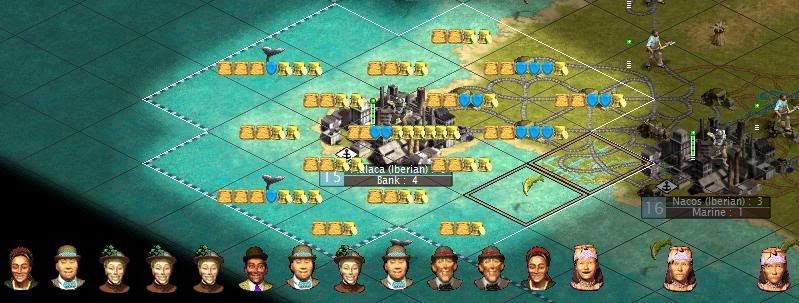
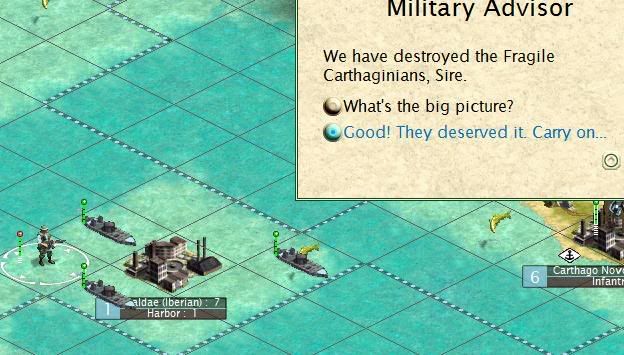


 It'd be hard not to have one, if it's not a wrap-around world.
It'd be hard not to have one, if it's not a wrap-around world.